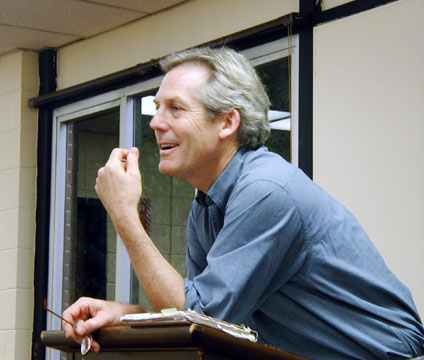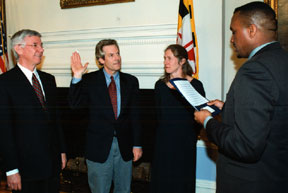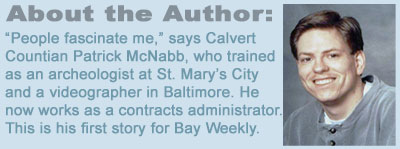|
|

He’s as much a Maryland treasure as a blue crab boiled in Old Bay.
by Patrick E. McNabb
The poet laureate of Maryland likes his crabs boiled in Old Bay and beer. Salty. Very salty.
But he wasn’t always so smart.
“Out of ignorance, I cooked with water many years ago,” confesses Collier. No wonder. He’s a born Westerner, hailing from Arizona. He’s lived in Maryland only since 1984. But it’s Maryland he calls home.
“Maryland has become a home for me in a way that my birthplace never was. I’ve always felt like I was meant to go to another place, a place with trees and weather,” says he.
Not to mention crabs and Old Bay.
“Maryland is that kind of place for me,” he professes. “Because I am home, I’m able to write comfortably.”
As the critics agree. Collier’s latest collection of poems, The Ledge (2000), was a finalist for the National Book Critics’ Circle Award for Poetry.
On Poetry, Collier Is Maryland’s Main Man
That success is one of the reasons that, early in 2001, Collier was elevated to the lofty post of poet laureate of Maryland.
Poet laureates don’t necessarily sing their songs for presidents and governors. But that’s who hires them, and the honor of the thing is considerable, making up for the pay, which is nonexistent.
Michael Collier “is a Maryland treasure,” said Gov. Parris Glendening at Collier’s installation as poet laureate.
He is Maryland’s seventh laureate since the post was created by the Maryland General Assembly in 1959, and the second appointed by Glendening. The last was Roland Flint [Vol VI, No. 15, 1998], no longer among us. Both Flint and an earlier laureate, Linda Pastan, are friends and influences of Collier.
“All of the laureates who have preceded me are terrific poets” Collier says, adding, “Roland Flint is someone I learned a great deal from.”
Collier’s honorary position gives him official permission to do what he likes best: reaching out to his fellow citizens and sharing his enthusiasm for poetry.
As poet laureate, Collier regularly visits local libraries, schools, civic clubs or wherever else he may be invited. His goal is always the same: to educate, excite and enlighten citizens young and old about the art and craft of poetry.
Collier is well suited to this role. Since 1984, he has been a professor in the English department of the University of Maryland College Park while also serving as the co-director of the school’s Creative Writing Program. Collier’s own writing is pretty creative, as well.
Collier’s Poetic Recipe
Like the recipe he uses for cooking his crabs, a Collier poem consists of many elements that must be perfectly blended.
First, Collier writes in a free verse, holding his poems together with the alliteration of consonants and assonance of vowel sounds but little rhyme. The stanzas often break the verses in mid-sentence, urging the reader to absorb the whole poem, not just small parts.
Next, Collier’s poems tend to be allegorical, taking us to a place far away from where they begin. “I always think the greater the distance the more interesting the poem,” he says.
Finally, like the bright, bright red of a freshly boiled crab, Collier’s poems are vibrant with richly textured descriptions and clever word play.
Consider “The Wave” to see how the poet combines all of these elements. Set during a baseball game at Baltimore’s old Memorial Stadium, the poem preserves a moment in time long after the score has been forgotten.
Collier starts simply. He describes the vendors and the crowd, using phrases like “the Budman with his quick-pouring mechanism strapped to his wrist like a prosthesis” and the “skinny kid sitting between fat parents.”
Next he quickens the tempo as a few buzzed soldiers who “have paced each other with a beer an inning” begin to urge on the crowd.
Here’s what happens next:
At first only a few respond, but like molecules quickening
or cells dividing or herds stampeding we coalesce —
orison provoking unison — section by section, as if
township by township, our standing up and sitting down
becomes the Simon Says and Mother May I? of a nation,
as it runs through our rippling, shimmering upraised hands
that form the crest of a wave built on the urges
and urgings of the soldiers …
Like a good crab gumbo, “The Wave” should be savored and not slurped.
You might think that a state poet would have to write sonnets to the Chesapeake or poems about the Patuxent. But not Collier. His subjects are his life, family and people he knows.
“I’m not really much of a nature poet, although I’ve got a lot of birds in my poems,” he says.
One of those, “Brave Sparrow,” is Collier’s favorite among his poems. Set in the world of a small bird, the poem is an allegory for the individual in an often frightening world.
And if you see the robins
in their dirty orange vests
patrolling the yard like thugs,
forget about the worm. Starve
yourself …
Collier doesn’t like to be pinned down on his themes, but if you think hard, you’ll see it’s the changing nature of the moment that fascinates him.
Early Bookworm Gets the Prize
So how did an Arizona Cardinal become a Baltimore Raven?
Collier was born in Phoenix, Arizona in 1953. As a kid, he spent much of his free time at the local library absorbing the works of Robert Frost, Walt Whitman, Elizabeth Bishop, John Donne and John Berryman.
“I read a lot as a kid,” says Collier. Although I don’t think I necessarily read more than any other typical bookworm boy or girl, I wanted to make something out of words.”
Collier wrote his way through college, and in 1979 earned a master’s degree in fine arts from the University of Arizona at Tucson. “In writing, it felt as if I was participating in some fuller way,” he said.
Two years later, he was invited to attend his first Bread Loaf Writer’s Conference at Middlebury, Vermont. It was not only a prestigious invitation but one that would change his life.
Begun by such notables as Robert Frost and Willa Cather, the annual August conference of writers of all sorts has been described as “one of America’s most valuable literary institutions.”
At Bread Loaf, Collier met and became friends with future Maryland laureates Pastan and Flint. The timing was also fortunate in another way. Collier’s wife, Katherine, a librarian who would later become director of the Anne Arundel Community College Library, had just accepted a job at the National Library of Medicine in D.C.
“My wife and I were living in San Diego, California,” says Collier. “When we came to Washington, I knew two people already in Linda Pastan and Roland Flint.”
They left the area some eight years ago for New Haven, Connecticut. Katherine Collier worked at Yale, while he commuted back to the University of Maryland.
They didn’t stay.
“We had the opportunity to live there permanently,” he says. “But we missed Maryland terribly. It had to do with the friendliness of the people and their openness. New England didn’t feel quite as open and friendly.”
In Maryland, he also rubbed shoulders with poets whose standards challenged his own.
“There are lots of wonderful poets in Maryland,” says Collier. In addition to Pastan and Flint, Collier praises Lucille Clifton, the poet laureate from 1979-1985 under Gov. Harry Hughes, and Michael Glaser of St. Mary’s College.
“Michael Glaser is terrific,” Collier says.
Collier must have been pretty good, too. In 1995, he became director of the Bread Loaf Conference. This esteemed honor is practical as well as ceremonial. As director, Collier helps nurture and develop the talents of emerging writers and poets, much as he was once helped. Sounds a lot like a poet laureate, doesn’t it?
 |
photo courtesy of Governor’s Press Office
Poet laureate Michael Collier is sworn in with Gov. Glendening and Collier’s wife, Katherine, looking on. |
Among the People
As poet laureate, Collier extends the work he does at Bread Loaf, reaching out not just to the privileged few but to all our citizens.
At a recent reading at the Calvert County Library in Prince Frederick, Bay citizens gathered together to listen to Collier’s poems and ask questions.
Prince Frederick residents and amateur poets Carla and Anita Hooper came to see Collier in hopes of getting some writing tips.
“What we write are more like rhymes. His are like short stories that were very emotional,” Carla Hooper said.
“I didn’t know that Maryland had a poet laureate,” said Karen Chambers of St. Leonard. “I think his poetry is easy to read and easy to understand. There’s nothing inaccessible about his poetry, like a lot of more contemporary poets who have streams of consciousness.”
Dan Fisher, former journalist and English teacher at Windy Hill Middle School, came to get some ideas on how to turn kids on to poetry.
“I thought he really did a nice job,” said Fisher, who promised to use Collier’s poems in the classroom. “I think they’re the kind of poems that anyone could easily understand.”
Among the people, Collier doesn’t just read; he shares his recipes for successful writing.
“The most important thing for anybody who wants to write is to just read constantly,” Collier says. “It’s through reading that you find you’re learning how to write.”
But what should you read?
First, read what you’re interested in writing. To that, add a good dose of current literary work and criticism.
Then, you think of yourself as a writer.
“You begin to figure out where it is you want your work to be published,” he says.
Finally, we all know where the pudding is proved.
“At some point,” he says, “you send your short stories or poem to the editors and test yourself that way.
“This is the way that writers for the last 150 years or so have got themselves going.”
Finally, Collier adds a bit of encouragement:
“The great thing about writing is that you only need a pencil, a piece of paper and a library card.”
To read more of Collier’s poetry, visit your local library or bookstore or attend one of his readings. The next scheduled reading is November 29 at Maryland Institute College of the Arts, E. Preston St. Baltimore: 410/225-2300.

The Wave, Scientific
Take 25 to 35 bored fans. Add one or two instigators, like “a few buzzed soldiers.”
What do you get?
The Wave!
In the journal Nature, Tamas Vicsek and his colleagues report their study of this universal sports phenomena. They watched the footage of several Mexican stadium crowds, applied a mathematical model and analyzed the results.
The scientists discovered that the wave tends to go clockwise at an average speed about 20 seats a second. They say their research could have applications in riots or other settings where predicting large crowds is critical.
Copyright 2002
Bay Weekly
|